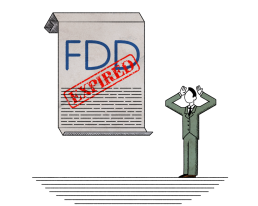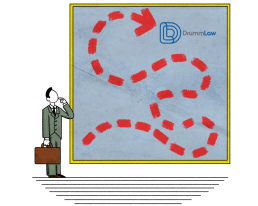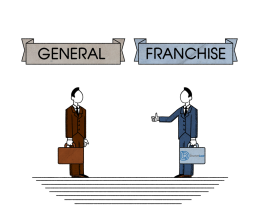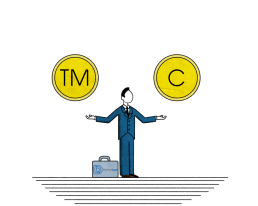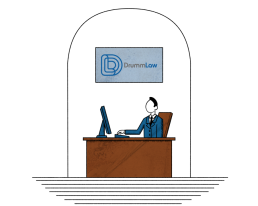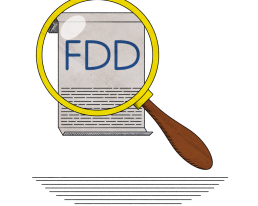Importance of Franchising Industry Growth
The franchise industry has been growing exponentially, as there are many new opportunities available as a result of Covid-19. Entrepreneurs used the upheaval of the pandemic to create new business models to cater to the needs of people stuck at home in the shutdown. And when the model works in one town, this is a good time to branch out into franchising and take the business model to another part of the country as well.
Innovations like mobile and delivery-only restaurant concepts are taking the country by storm. Because many people are not going to traditional sit-down restaurants as much, this is an excellent business opportunity. Additionally, because many people are doing home improvements while stuck at home, mobile home improvement franchises have also been emerging.
The rise in virtual work has left many office fronts sitting empty. This means that in most of the country, rental space is getting cheaper. Franchisors can get a space for their new business at a cheap rate, which helps the bottom line as they are trying to build the new company.
In addition to new franchises, there are some notable current franchises that have been doing well in the pandemic. Popeye’s and Domino’s pizza are flourishing, considering how many people want a take-out meal in these difficult times. School related franchises are also doing well, as the school situation across the country is difficult at best. Mathnasium, a private tutoring company, is getting a lot of business from people concerned their children are falling behind. And with all of the new safety regulations in place, franchises like Fastsigns are booming as retail establishments, restaurants, and schools clamor to follow regulations and create the necessary signage to keep people safe.
The growing franchise industry is important because it is an excellent time to get to work as a franchisor, to develop a concept and to market it to others. If you have ever had the interest in taking a chance on a business idea, now is the time. The pandemic has shaken up the snow globe of franchising, and with so many new businesses available, this is a great time to jump.
But as the old saying goes, if it's worth doing, it's worth doing right. If you want to make your franchise dreams a reality and jump on the bandwagon of the burgeoning franchising business, start with an experienced franchise lawyer who can help you lay the foundation for a successful franchise down the road. They can help you turn your business model into a workable business to start with, and that in turn can eventually be franchised across the country.
Franchise FDD Expiration Rules by State
Your FDD will expire at the earlier of (1) when the new FDD is issued, or (2) when you reach a state or federal expiration date.
New FDD Issuance
Once you issue your new FDD, your old FDD expires.
For example, if you are in California and you issue a new FDD on April 20, your old FDD expires everywhere. Once you issue a new FDD anywhere, you are no longer allowed to use the old FDD anywhere.
State or Federal Expiration Date
Your FDD will expire on a national level 120 days after your fiscal year end.
So, if your fiscal year end is December 31, your FDD will expire on April 30.
When your FDD expires in a certain state will depend on whether that state’s registration is tied to your fiscal year end or if it is tied the effective date of registration. Many states require that your FDD arrive in their office before the expiration date so do not plan on mailing the FDD a day or two early.
Several states’ registrations also expire 120 days after your fiscal year end: Illinois, Minnesota and New York. Hawaii and California have shorter timelines. Hawaii’s registration expires 90 days after the fiscal year end and California expires 110 days after the fiscal year end. Most franchisors do not prioritize the Hawaii deadline because the filing fee for a renewal and an initial filing (or late filing) is the same. Because of this, the California deadline generally controls the FDD update timeline.
Other states will expire 12 months after your state registration date. It is important to realize that while your registration in a state may still be effective, your FDD may not. For example, you are a franchisor with a December 31 fiscal year end. Your FDD expires on April 30. You might be registered in Maryland with an effective date of June 30, meaning your Maryland registration is still valid until the following June 30. However, if your FDD is expired, you cannot use it to offer or sell franchises in Maryland, even though you have a valid registration. This is one of the reasons it is important to update your FDD well before expiration date.
Here is a chart showing the registration or filing state’s expiration timelines:
|
REGISTRATION OR FILING STATE |
REGISTRATION EXPIRATION DATE |
| CALIFORNIA | 110 days after your fiscal year end |
| CONNECTICUT | Once exempt, does not expire |
| FLORIDA | One year after the effective date |
| HAWAII | 90 days after your fiscal year end |
| ILLINOIS | 120 days after your fiscal year end |
| INDIANA | One year after the effective date |
| KENTUCKY | Once exempt, does not expire |
| MARYLAND | One year after the effective date |
| MICHIGAN | One year after the effective date |
| MINNESOTA | 120 days after your fiscal year end |
| NEBRASKA | Once exempt, does not expire |
| NEW YORK | 120 days after your fiscal year end |
| NORTH DAKOTA | One year after the effective date, but an amendment or early renewal is due 120 days after your fiscal year end |
| RHODE ISLAND | One year after the effective date |
| SOUTH DAKOTA | One year after the effective date |
| TEXAS | Once exempt, does not expire |
| UTAH | One year after the effective date |
| VIRGINIA | One year after the effective date |
| WASHINGTON | One year after the effective date |
| WISCONSIN | One year after the effective date |
If you have any questions, please feel free to contact us.
How to Choose the Best Franchise Attorney
A franchise lawyer is a lawyer that has specialized in the area of franchising, both for franchisors and franchisees, and has knowledge in all legal issues involving both state and federal franchising laws.
Selecting the right franchise attorney for your business can be a daunting task, as most law firms claim to have at least some experience in the area of franchise law. Before selecting your franchise lawyer, it’s important to understand a few things:
- What franchise lawyers do
- Why you need a franchise attorney
- What a Franchise Disclosure Document (FDD) is, and how a franchise attorney can help
What does a franchise attorney do?
By contracting an experienced franchise attorney, you aren’t just helping protect yourself against any inconsistencies in your Franchise Disclosure Document or liabilities in the process — you’re also helping mitigate any potential issues along the way.
Why do I need a franchise lawyer?
A competent franchise attorney can offer you incredibly useful suggestions how to structure your new or existing franchise business. Selecting the right franchise lawyer also means having the right team by your side if things happen to go south, for a variety of reasons.
About Drumm Law
At Drumm Law, our mission is simple — we are a virtual firm with an award-winning team of franchise attorneys that are ready and willing to assist you with any of your legal franchise needs.
Learn more about how Drumm Law can help with your franchising processes.
Choosing the Right Franchise Law Attorney
A common misconception about lawyers when it comes to business owners is that they just need a “business” lawyer that helps cover everything.
The reality is, when embarking on the franchising journey, whether as a franchisor or franchisee, it’s incredibly important to find a franchise lawyer who specializes not only in franchise law — but in your specific industry, if possible.
Just like lawyers who focus on bankruptcy law, or tax law, for example, a franchise attorney is well-versed in the legalese and best practices necessary to not only help with documents such as Franchise Disclosure Documents (FDD) on the front end, but also to help represent and defend franchise entrepreneurs whenever necessary.
When working with important franchising document — whether it be FDD documents, financial disclosures, liability agreements, etc. — it’s incredibly important to have a vetted, experience franchise lawyer to help guide you through the processes.
Having an experienced franchise lawyer can help make everything from renewing leases and setting up corporate entities to Franchise Disclosure Documents move more smoothly.
About Drumm Law
At Drumm Law, our mission is simple — we are a virtual firm with an award-winning team of franchise attorneys that are ready and willing to assist you with any of your legal franchise needs.
Learn more about how Drumm Law can help with your franchise. Contact us today.
Trademark vs. Copyright: What's the Difference
When creating a new product or service, or even forming a new entity, understanding the differences between trademarks and copyrights can be vital.
The first step is really a simple one: it’s important to find the right trademark lawyer for you. At Drumm Law, we’re proud to offer attorneys with expertise in the area of trademarks. We work with all of our clients to help them efficiently, and cost-effectively, setup their businesses and position them to be the most successful versions of themselves.
“A lot of times, (people) misuse the word copyright, like ‘I want to copyright my brand,’” said Mike Drumm, attorney and founder of Drumm Law. “One of the most clever sayings in the world is “I want to protect (my brand). A trademark protects a brand, copyright protects you from copying a product like music or a book.”
In short, the difference between trademarks and copyrights, although seemingly confusing, can be simply conveyed as this: trademarks protect commercial names, phrases and logos (i.e. the name of your beer and the logo of your company). Copyrights generally protect creative works (i.e. the design of the label on your beer). While both may be important, it’s the trademarks that are of the utmost importance for breweries.
“Trademark is, ‘I have a brand and you can’t have a brand that looks like mine,’ but copyrighting is protecting something you created — not the idea,” Drumm added.
About Drumm Law
At Drumm Law, we offer an experienced team of trademark attorneys, proficient in helping our clients:
- Select and file proper trademark applications
- Undergo trademark clearance searches
- Defend/file trademark application prosecution
- Monitor trademark usage and maintenance
- Conduct intellectual property audits
- And more…
Contact Drumm Law’s trademark lawyers to receive help with your trademarking processes at.
What does a franchise lawyer do?
When deciding to embark on franchising your business, or franchising a new business, gathering all of the information needed before making the important decision of hiring a franchise attorney is important.
Sometimes, however, it can be confusing as to why you need a franchise lawyer, or what exactly the benefits are of having one. So, what does a franchise attorney actually do?
In short, a franchise agreement is a massive commitment. A relationship between a franchisee and franchisor can be a 20+ year relationship that may require an initial investment of tens, if not hundreds of thousands of dollars.
As with any financial agreement, a franchising agreement comes with mountains of paperwork and liability disclaimers — often exceeding 50 pages.
The Franchise Disclosure Document (FDD), a legal document that must be given to individuals that are interested in buying a U.S.-based franchise as part of the pre-sale “due diligence” process, generally totals 200+ pages.
The Federal Trade Commission (FTC) created these guidelines in 1978 that required franchisors to share information prior to allowing a new franchisee to join their business.
Learn more about Franchise Disclosure Documents.
About Drumm Law
At Drumm Law, our mission is simple — we are a virtual firm with an award-winning team of franchise attorneys that are ready and willing to assist you with any of your legal franchise needs.
Contact one of our franchise lawyers today to get legal help with your franchise.
Learn more about franchising your business here.
Why Do I Need a Franchise Attorney?
When you’ve finally decided to start the process of potentially franchising your business, there’s a lot to consider. From contemplating potential franchisees to understanding the proper documents and protection needed for your business, the franchising process can sometimes feel more daunting than it needs to be.
But before you decide to franchise your business, you need to start by finding a franchise lawyer or attorney that not only knows your industry — but knows franchising inside-out.
Business entity advice
A competent franchise attorney can offer you incredibly useful suggestions how to structure your new or existing franchise business. When it comes to selection entity types, there are a variety of options: Limited Liability Corporation (LLC), Subchapter S Corporation, C-Corporation, etc. Do you know the differences?
Selecting the right franchise attorney for your new franchise is crucial in helping determine the legal rights and liabilities as a business owner.
Available for protection
Nobody embarks on a new business venture expecting to fail. However, unforeseen circumstances (see: Covid-19) are always right around the corner. Selecting the right franchise lawyer means having the right team by your side if things happen to go south, for a variety of reasons.
About Drumm Law
At Drumm Law, we understand that today’s law firms are inefficient and outdated. That’s why, as a virtual law firm, we’re proud to offer franchisors and potential franchisees expert services in the area of franchising and Franchise Disclosure Documents.
Learn more about our franchise lawyers or contact us for more information.
How to Choose The Best Franchise Lawyer
When it comes to creating and filing the legal documents necessary for starting the process of franchising a business, it’s best to leave the long and difficult process to a franchise attorney with expertise in the area of franchising.
Benefits of a franchise attorney
By contracting an experienced franchise attorney, you aren’t just helping protect yourself against any inconsistencies in your Franchise Disclosure Document or liabilities in the process — you’re also helping mitigate any potential issues along the way.
For example; at Drumm Law, we’re passionate about utilizing our knowledge in franchise law to help your business:
- Avoid conflicts of interest
- Have a peace of mind regarding the legality of your documents
- Avoid having to pay for legal documents more than once
- Enjoy attorney-client privilege
How to select a franchise attorney?
Now that we’ve broken down the benefits of hiring a franchise lawyer, now comes the real test — what should your business look for in a franchise attorney?
For one, your businesses should look to contract a franchise law firm that has experience on both the franchisor and franchisee sides of the equation. Also, when it comes to Franchise Disclosure Documents, finding attorneys that will work on a “flat fee” basis (instead of hourly) can also greatly benefit your business.
About Drumm Law
At Drumm Law, we’re proud to offer your business with a personalized franchise attorney with decades of experience in franchising, Franchise Disclosure Document creation/review and more.
“We actually have 11 franchise lawyers – one of the largest franchise legal departments of any law firm,” said Mike Drumm, attorney and founder of Drumm Law. “And we are one of the only (law firms) that, for FDD’s, charges a flat fee for every state.”
Drumm Law is also proud to offer legal certainty and experience that is hard to find anywhere else — with a team that includes two former state regulators, who know the processes inside-out.
Contact one of our franchise lawyers at Drumm Law so we can help with your franchising processes.
What is a Franchise Disclosure Document (FDD)?
Being an educated franchisee (or franchisor) means gathering all relevant information needed before making a solid business decision. And when it comes to the process of sorting through franchising opportunities for your business (or potentially becoming a franchisee yourself), one of the most critical pieces is the Franchise Disclosure Document, or FDD.
A Franchise Disclosure Document, in the simplest of terms, is a legal document that must be given to individuals that are interested in buying a U.S.-based franchise as part of the pre-sale “due diligence” process. The Federal Trade Commission (FTC) created these guidelines in 1978 that required franchisors to share information prior to allowing a new franchisee to join their business.
What does a compliant FDD entail?
A compliant Franchise Disclosure Document consists of over 23 items that are critical to beginning the franchising process, providing information on a variety of areas such as franchise history and background, costs, fees, etc. Some of the more specific areas of a compliant FDD include:
- Business Experience
- Litigation
- Estimated Initial Investment
- Territories
- Financial Statements
- And more…
You need a franchise lawyer
While a Franchise Disclosure Document may seem relatively straightforward, it’s always important that potential franchisors (or franchisees) have a franchise agreement lawyer review the Franchise Disclosure Document before any agreements are made.
“The Franchise Disclosure Document is the document that a franchise is required to have,” said Mike Drumm, attorney and founder of Drumm Law. “We will work to primarily create that for franchisors, and will help update the FDD every year. We will also review (the FDD) for potential franchisees.”
About Drumm Law
At Drumm Law, we understand that today’s law firms are inefficient and outdated. That’s why, as a virtual law firm, we’re proud to offer franchisors and potential franchisees expert services in the area of franchising and Franchise Disclosure Documents.
Learn more about how Drumm Law’s franchise lawyers can help with your franchising processes.
You can read more about what an FDD is in our Franchise Education Section here: What’s an FDD?
How to Legally Play Music in Your Restaurant
So…you own a restaurant (or any business open to the public) and want to play music at your location. Maybe it’s live concerts with local bands. Maybe you just want the ambiance of having something on in the background day to day. To liberally paraphrase Lesley Gore’s 1963 hit, “It’s my restaurant and I’ll jam if I want to!” Unfortunately, this is not a “just press play” situation, so before you start up It’s My Party for your customers, you may want to read on.
Sure, you can listen to whatever tickles your fancy at 8am alone in the restaurant, but if you are going to be playing music in the presence of patrons, it’s time to add another license to your file.
Licenses
Music is governed under Federal Copyright law. The Copyright Act grants five rights to a copyright owner:
- the right to reproduce the copyrighted work;
- the right to prepare derivative works based upon the work;
- the right to distribute copies of the work to the public;
- the right to perform the copyrighted work publicly; and
- the right to display the copyrighted work publicly
For purposes of this blog, we are focusing on number 4: the “performance” aspect, or, in this case, the performing of copyrighted music at your restaurant. Now before you get up on a table with that microphone…
What is a performance?
According to the US Copyright Act, “to “perform” a work means to recite, render, play, dance, or act it, either directly or by means of any device or process or, in the case of a motion picture or other audiovisual work, to show its images in any sequence or to make the sounds accompanying it audible.”
I’m sorry, what now?
In layman’s terms: a performance is playing music in a public setting (i.e. the restaurant).
This means there are two common types of performances you’ll need to consider here: playing pre-recorded music and hosting live music.
Let’s start with playing pre-recorded music. That means Spotify, Pandora, Apple Music, YouTube, your iTunes library on shuffle, vinyl records, CDs, 8-tracks, cassettes, a collage of cell phone videos from that summer you followed Widespread Panic on tour.
Did you say no streaming?
Yep. You probably have your own Spotify or Apple Music account and can Bluetooth or plug into your restaurant’s speaker system, right?
Not so fast.
Well what about playing vinyl records or CDs that I own? I paid for them. Why can’t I play them? They are mine.
Negative Ghost rider, the pattern is full.
While you may own the physical media or pay for the music service, the rights that come with this payment are non-commercial. You can rock out in your car or with your air pods but when you start playing this music for the public, you are now entering the realm of “performance” (air guitar optional).
Streaming services like Spotify, Apple music, Google Play, and Pandora are designed for consumer use and are not fully licensed for commercial purposes. Same goes for that $10 CD you bought. They are for personal use only and do not include a “performance” license, therefore playing them in a commercial setting violates copyright law.
Does that mean we all have to eat and drink in silence?
Not at all. If you want to play music in your restaurant, you have three options.
Option 1: obtain a commercial license from one - or multiple - Performing Rights Organizations (PROs) and play music that you legally own (CDs, vinyl records, digital downloads, etc.)
Okay… what is a PRO?
Great question. Musicians, composers, and songwriters create music and own the intellectual property thereof. PROs exist to protect all that IP and ensure that the artists get paid for its use. Musicians can only sign up with one PRO - the three main ones are American Society of Composers, Authors and Publishers (ASCAP), Broadcast Music, Inc. (BMI) and SESAC. These PROs protect the rights of the artists by selling and enforcing licensing of music in establishments like your restaurant.
You may have already received a nice letter threatening death and destruction from one or more PRO(s) for not having their yearly license. Something like this:
Dear Restaurant Owner,
My name is PERSON and I’m your BMI territory representative.
Every effort has been made to resolve your BMI license amicably, but without success. Because we’ve been contacting you in an attempt to reach a timely and amicable resolve for the music license at your business, RESTAURANT NAME is currently being considered for Copyright Infringement action. It is important that you understand BMI exists to help businesses and other organizations that use music to comply with US Copyright Law in an easy and cost-effective way.
It is very important that I hear from you today.
The cost of using music without permission can be very high. Each musical composition used without authorization entitles the copyright owners to damages between $750 and $30,000, plus attorney's fees and costs. The amount awarded is at the discretion of the judge, who can grant an award as high as $150,000 per infringement, if the court determines the infringement to have been willful.
Please contact me at your earliest convenience to secure the required copyright permission licensing for your business.
Thank you for your prompt attention,
PERSON
If you decide to go with this option, you will either have to obtain licenses from all three PROs or only play music from the catalogue of the PRO with whom you hold a license. Licensing fees are based on the occupancy of your restaurant and can add up in a hurry.
This leads us to the more popular (and cost-effective)
Option 2: sign up for a commercial streaming service that includes the commercial licenses. Think of it as a fancier Spotify. These services run between $25 and $27 a month and include full commercial licensing on a full catalogue of songs, making this option indubitably cheaper than licensing from the PROs. Pandora Business and Sirius XM Business are two popular options.
Don’t like the sound of those numbers? There is one final possibility.
Option 3: play the good ol’ fashioned radio… so long as you meet certain requirements.
If you want to play your favorite local radio station, you must have the “right” size building and the “right” number of speakers. Under the US Copyright Act, a restaurant is eligible for the exemption if it either (1) has less than 3,750 gross square feet of space (in measuring the space, the amount of space used for customer parking only is always excludable); or (2) has 3,750 gross square feet of space or more and (2) uses no more than 6 loudspeakers of which not more than 4 loudspeakers are located in any 1 room or adjoining outdoor space.
When considering these options, it may be worthwhile to also look at your event schedule.
What if I have live bands?
As a host of live music, you (the venue) are responsible for the licensing fees of the songs played in your establishment. A Pandora Business or Sirius XM account does not cover (and there is, unfortunately, no equivalent for) live music. You will have to go with a PRO option.
“But hold on,” you say, “I’m not hiring famous bands for my restaurant. I only work with local artists. Surely, I don’t need a license for that.”
Well, we hate to disappoint, but even local bands sign up with PROs (and don’t call me Shirley). The above-listed organizations have no scope requirements when it comes to membership (although SESAC is invitation-only) and even small-time performers wishing to protect their music can apply. The second issue here is that your local band may perform cover songs. PROs cover the songwriter, not the performer, so if you have a completely original set that finishes with Freebird, you’re still looking at a copyright violation.
Therefore, if you want to have live music and do not want to pay for PRO licensing, you’ll have to:
(1.) Have the band grant you a public performance license for its songs; and
(2.) Have the band agree to only play their music (no covers). Remember that you (the venue) are ultimately responsible for complying with copyright law and proper licensing so it’s important that they (the band) understand that you are on the hook if they decide to play Freebird after all.
Three PRO licenses for one show? Can I just get one?
Sure. If you don’t want to give up on covers entirely, but don’t want to pony up for all three licenses either, you can settle on just one. You’ll just have to work with the band to select only cover songs licensed by that PRO. Ultimately, the decision of which PRO or PROs to buy licenses from may factor into how frequently you host live music and vice versa.
We have a Live Music Agreement template available to restaurants at no charge. All you have to do is ask. Our template lets you choose which PRO license you have, if any, and provides links to each PRO database so bands can pre-screen cover songs:
 Our agreement also includes a limited public performance license grant for the band’s original material.
Our agreement also includes a limited public performance license grant for the band’s original material.
I haven’t done any of this and it’s been fine so far. What if I keep doing what I’m doing?
Harassment from the PROs. Bad karma. Oh… and fines exist. Remember the BMI letter above? “Between $750 and $30,000.” Is Freebird really worth $30k?
Questions? Feel free to contact us. We’re happy to discuss your options in more detail and help you figure out the best way for your business to be in compliance.

